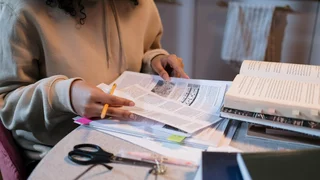
SLAM - Writing and Reading motivating Tailor-made approaches for young teenagers
This research project focuses on the one hand on how reading and writing didactics reinforce each other. On the other hand, we will look for the support needs of teachers for didactically responsible writing and reading tasks. We use this information to develop a tool that alleviates the identified needs.

Towards a combined reading and writing didactics
Being able to write and read different types of texts strategically and well are essential skills in education and 21st-century society. Various studies (PIRLS 2016, PISA 2018, Peiling Nederlands Basisonderwijs 2018) show that not all Flemish pupils achieve the intended reading and writing standards.
The renewed reading didactics are gradually finding their way into education, but there is also a need for a powerful writing didactics. Since reading and writing are complementary, it makes sense to combine and practice those two skills.
Teacher support needs
Teachers are still not investing enough in meaningful educational activities in which reading and writing go hand in hand, both during Dutch lessons and in other areas of learning. They lack the confidence to act and the necessary competences to design meaningful tasks for their target group. A sound didactic approach makes pupils better in reading and writing and it is more likely that they will achieve goals in other areas of learning in which they apply their reading and writing skills.
Tool for teachers to design reading and writing tasks
This research wants to find out what teachers need to design such motivational reading and writing tasks themselves for young teenagers (approximately 10 to 14 years) in the 3rd stage of primary education and the 1st stage of secondary education.
We examine how reading and writing didactics can reinforce each other. Through a network and source analysis we investigate what evidence exists on this. We map out which researchers, organizations and schools are working on this. We also look at Ireland, where the NCCA (National Council for Curriculum and Assessment) successfully implemented a new language curriculum in primary school.
The research project consists of three parts:
- We are investigating in four schools what can give teachers (3rd stage primary education and 1st stage secondary education) more guidance to design motivational reading and writing tasks themselves.
- Through a methodological mix of reflective experiential learning and educational design research, we arrive at a concrete proposal that supports teachers in the form of a tool or professionalization offer.
- Thirdly, through a cross-school focus group discussion, we examine what motivational reading and writing tasks mean for the transition from primary to secondary education.
Together with schools
To get a clear picture of the support needs of teachers, we will work together with teachers in four different schools of which 2 primary schools and 2 secondary schools.
Schools that want to focus on better reading and writing tasks and want to find out together with us what teachers need to design motivating, didactically sound reading and writing tasks themselves can apply as a partner school.
With each of the four selected schools we will map out a trajectory of several months. As experts in language didactics, we provide input and support for the concrete elaboration of reading and writing tasks that fit into the learning line of that period for those specific classes.
The participating teachers from those four schools improve their didactic insights and skills on the basis of scientific research.
From their doubts and from the thresholds they experience, we learn about the specific needs of teachers. Based on this, we are developing a tool that offers teachers more guidance when designing motivational reading and writing tasks.
Meet the team
Work with us?
Request customised research
We are happy to help you formulate your research question and approach.





